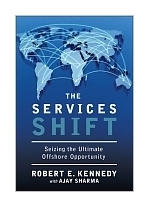|
||
• wydawnictwa polskie
• Zamów informacje o nowościach z wybranego tematu • kontakt
• Cookies na stronie |
THE SERVICES SHIFT: SEIZING THE ULTIMATE OFFSHORE OPPORTUNITYKENNEDY R. SHARMA A.wydawnictwo: PEARSON ED , rok wydania 2009, wydanie Icena netto: By now, most business people, pundits, and politicians in the United States and other developed nations have come to grips with the phenomenon of manufacturing jobs moving offshore: The process is variously referred to as “outsourcing” or “offshoring.” But a far bigger wave of change is approaching the shores of those same developed nations: the globalization of services. Where are the jobs going? Which companies benefit–or could benefit? How exactly does services offshoring work? How do you “get in the game”? Who makes a good partner?And what are the policy implications? The Services Shift answers all these questions, and more, offering powerful insights for managers, public policymakers, and citizens alike. Leading researchers Robert E. Kennedy and Ajay Sharma reveal how services offshoring works in both industries and individual companies, and show how to define and implement realistic services-sourcing goals for your organization. You’ll learn who’s involved in services offshoring, understand leading business models, and tour the main geographical centers–from China and India to Hungary, Russia, Morocco, Brazil, South Africa, and Mauritius. Drawing on detailed interviews with participants, the authors review the management skill sets associated with successful services offshoring. Next, they assess policy initiatives in both developing and developed countries, including U.S. proposals aimed at restricting the offshoring of services. Finally, they preview the newest trends in services globalization, helping you prepare for the world as it will be–next year, five years from now, and in a decade. Services offshoring: what’s different, what’s the same? How the offshoring of services resembles the offshoring of manufacturing–and the important ways it differs Defining a realistic framework for services offshoring How to set clear goals, define what to offshore, and then execute successfully Touring the offshore universe: models, locations, activities, and beyond Understanding all your options–and their tradeoffs and implications Understanding the broader political and economic implications How governments are likely to act–on both ends of the provider-to-consumer spectrum–and how that will impact you Robert E. Kennedy is the Tom Lantos Professor of Business Administration, Director of the Global Initiative at University of Michigan’s Ross School of Business, and Executive Director of the William Davidson Institute (WDI). He spent eight years at Harvard Business School, researching global strategy and teaching international business courses. He has consulted and invested venture capital throughout Europe and Asia. Ajay Sharma is Research Manager for WDI’s Globalization of Services Initiative. In 1992, he joined Infosys as it was ramping up its offshore software development business. Later, he joined PriceWaterhouseCoopers as a technology consultant. Table of Contents Acknowledgments xv About the Authors xix Introduction 1 Chapter 1: Globalization of Services: What, Why, and When 17 Chapter 2: The Economics and Drivers of Offshoring 49 Chapter 3: Making It Real 89 Appendixes for Chapter 3 135 Appendix 3A 135 Locating a Task on the Process Decomposition Compass Appendix 3B 136 Assessing the Feasibility, Value, and Risk of Potential Outsourcing Efforts Appendix 3C 138 Assessing the “Offshoreability” of Potential Tasks and Processes Appendix 3D 140 What’s Typically Covered in an SLA? Chapter 4: The Supply Side 143 Chapter 5: Shifting Skill Sets 175 Chapter 6: The Services Shift: Policy Implications 199 Chapter 7: Looking Ahead 245 Appendixes for Chapter 4 263 Appendix 4A 263 Country Attractiveness Appendix 4B 264 Country Notes Appendix 4C 272 Country Profiles Index 317 352 pages, Hardcover
Po otrzymaniu zamówienia poinformujemy, |


